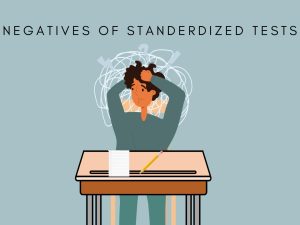The realities of being a bad test taker
Testing culture in America has reached a dangerous peak, raising the question, is there such thing as a bad test taker?
January 27, 2017
Test anxiety has become a hot topic of conversation recently amongst students and parents, who debate whether or not it even exists. With pressure constantly growing for students to push further, achieve more, and be constantly involved, it has become a much more prevalent issue. The build up behind major assessments, such as the SAT and ACT, have caused an increase in test anxiety, as well as general stress.
Test anxiety, according to the Anxiety and Depression Association of America, is caused by fear of failure, and a poor testing history. The pressure that society puts on this generation to succeed has created an atmosphere of unhealthy levels of stress and tension. The pressure to perform is extremely high, with college acceptance rates declining steadily as the years go by, with the most dramatic drops happening in the Ivy League, according to Business Insider. There is a lot of burden placed on students to perform well on standardized tests such as the ACT and SAT by colleges, many of whom rank standardized test scores as an extremely important factor in acceptance, according to NPR as well as The College Board.
Another factor that adds to this amount of testing anxiety is the intense testing culture that takes form in the classroom from a young age. According to PBS, on average, students take 113 standardized tests from pre-kindergarten to 12th grade. This number may not seem like a lot for 13 years of education, but it creates the stigma behind failure from an extremely young age. Standardized testing at a young age also creates competition that is unnecessary that will follow children through their entire childhood.
The argument that there is no such thing as a “bad test taker”, meaning being a person who consistently scores badly on tests because there is nothing but lack of preparation that can cause failure in tests is simply untrue. While a lack of preparation is definitely a factor of bad test taking, there is a question as to what “lack of preparation” can mean. Why are some children unprepared for major tests? The answer lies in the fact that preparing for tests such as the SAT is extremely expensive, time-consuming and stressful. The average SAT preparation class that is in person with a tutor can cost upwards of $1,000 – according to The New York Times. Classes also can range in time, with most averaging in at around an hour or two. While this may seem a small price to pay for a good score, many families cannot afford the cost of an in-person prep class, as well as the time to spare to attend classes.
Being a bad test taker begins at an early age due to the fear of failure, combined with general anxiety. There is definitely such a thing as being a bad test taker because having extreme test anxiety can cause lack of preparation due to lack of finances and time, negative attitude, feelings of helplessness and fear. This combination of feelings can cause a student to perform poorly on a test, not because they are “lazy” or “careless”, but because they are suffering from a severe form of anxiety.
It is important to remember that test anxiety is a very real thing, as well as an extremely valid form of anxiety and fear. The pressure that students are under today to perform and advance while being lifelong competitors with their classmates, is very intense. The drop in college acceptance rates turns students from focused to anxious, as their application becomes just one in a pool of highly qualified applicants, who are all striving for a spot in a class. All of these factors in combination create an environment that is detrimental to mental health and turns classrooms and testing rooms into breeding grounds for anxiety and panic attacks. Being a “bad test taker” is nothing to be ashamed of, and it is, without a doubt, an extremely authentic phenomenon that is only highlighted by the growing pressures that students are burdened with and which will only grow.
Colleges across the country have started the initiative of “test-optional” application, in which applicants have the option to send their standardized test scores as a part of their application. This idea is brilliant for most students who are performing at high levels in class and in the community, but are unable to perform well on tests due to being a “bad test taker.” The test-optional application tells students that it is okay to be a bad test taker and that other factors matter more than the grade applicants get on a standardized test. Colleges and Universities everywhere should adopt the test optional plan to ease the tensions of applying to college, and also destroy the perception that standardized test scores are the make-or-break of applications.












Mia • Mar 17, 2022 at 10:17 pm
I have to disagree with this article. This study: https://www.act.org/content/dam/act/unsecured/documents/pdfs/R1713-test-anxiety-2018-08.pdf done by the ACT shows that test anxiety independent of a lack of preparation does not affect performance. Additionally, nerves around a test are no excuse to not prepare for it- if anything they should be a motivator. And a lack of finances and time definitely don’t mean someone is bad at taking tests- those are environmental factors that are not intrinsic. This article argues that text anxiety causes students to a) do worse on tests, and b) not adequately prepare for them. A is simply false, since while test anxiety is a problem, it does not affect scores, and B just means that more preparation would have been enough to improve a students score, which means they aren’t a bad test taker, they just didn’t study. If a student does well on homework and in class, but not on tests, they likely only have a superficial knowledge of the subject.